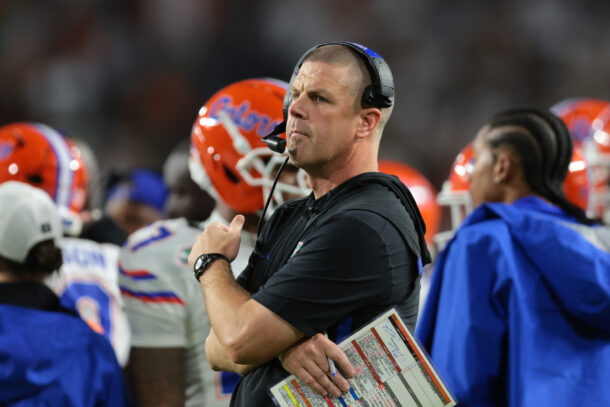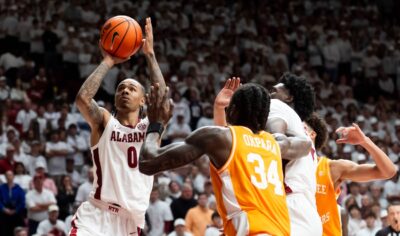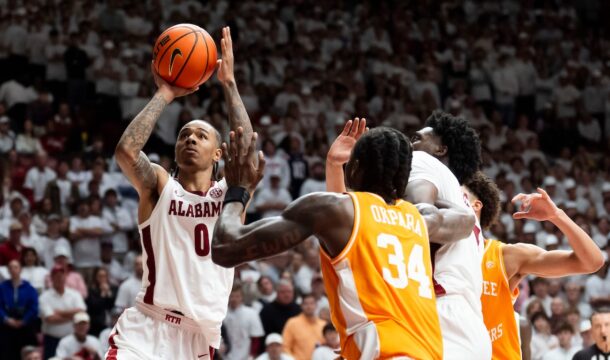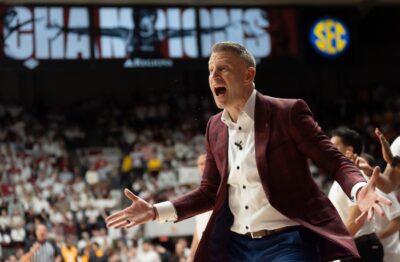
In the end, Billy Napier’s play-calling pride doomed his process and tenure at Florida
Billy Napier was fired by the University of Florida on Sunday afternoon, abruptly ending the most unsuccessful 3+ years of football at the proud SEC program since World War II. Napier’s 22-23 record as head coach speaks for itself. Only Tom Lieb, Florida’s coach from 1940-1945, managed to do worse in 45 games (20-25), and Lieb was hamstrung because many of his players enlisted to fight in World War II, leaving the Gators to tangle with programs like Georgia and Tennessee, who had less attrition due to on-campus ROTC programs that initially kept their players in (football) uniform and away from the war.
But setting aside the Bill Parcells “you are what your record says you are” litmus test, Napier’s time in Gainesville was ultimately undone by a lack of attention to the little details and mistakes he was brought to Gainesville to fix.
Given unprecedented administrative support and arriving at Florida at a time when long overdue new facilities were opening, the hope was Billy Napier, who was a critical recruiter in building Nick Saban’s imperious empire at Alabama and later built a tidy, championship-winning operation at previously moribund Louisiana, would construct another sleek machine given SEC resources and access to the most fertile recruiting ground in the sport.
Napier went to work, assembling an army of support staff, personally overseeing talent evaluations, re-establishing vital recruiting connections frayed during the “We don’t talk recruiting until recruiting season” Dan Mullen years, and insisting on a NIL operation that met the challenges of a rapidly evolving sport.
All of that work was necessary and completing it makes Napier’s failures all the more perplexing to industry insiders, who walk into the Florida building from Monday to Friday and see an operation and infrastructure very similar to the championship-producing environments in Tuscaloosa and Athens.
Just like Nick Saban and Kirby Smart, Napier talked constantly about being “process oriented,” about “stacking days” until eventually a championship culture and program was rebuilt in Gainesville. Unlike Saban and Smart, Napier’s couldn’t figure out what to do with all that infrastructure on Saturdays, the day process matters most.
Florida lost constantly because of a lack of attention to detail.
Locked in a nip and tuck road game at Utah in the 2023 season-opener, the Gators gave the Utes a first down when they put 2 players on the field wearing the same jersey number. The Utes scored a few plays later and the game never tightened again.
Later that season and just a week after a thrilling come-from-behind win at South Carolina, the Gators found themselves tied at home against a woeful Arkansas team. Despite playing terribly, the Gators were in position to win on a 39-yard field goal by Trey Smack, one of the nation’s best kickers. Instead, Florida received an illegal substitution penalty due to having too many men on the field, pushing the kick back 5 yards. Smack missed, and Florida lost in overtime. The Gators would lose their final 5 games and fail to qualify for a bowl.
Early this season at home against USF, Florida had the USF Bulls backed up deep with under 4 minutes to play. That’s when Napier’s team beat itself again. Dijon Johnson committed a pass interference penalty, moving the Bulls out of the shadow of their own goalposts, and that mistake was followed by an unsportsmanlike conduct penalty against redshirt sophomore defensive lineman Brendan Bett after he spit on USF offensive lineman Cole Skinner. The Bulls kicked a field goal after an 89-yard drive and won in The Swamp, 18-16.
Even on Saturday, in a rare SEC victory for Napier, the Gators struggled to get out of their own way. This time, Florida lined up with 12 men on the field for a critical 2-point conversion leading by 12 in the fourth quarter. After the illegal substation penalty, Napier was forced to kick an extra point. The end result was that Mississippi State had a chance to win, rather than simply tie, a 23-21 game on the final possession.
If you are scoring at home, the penalty marked the 5th time since 2023 that Florida failed to line up with the requisite 11 men on special teams.
For a program obsessed with “process,” those types of mind-numbing mistakes on Saturday are stupefying.
More remarkable was Napier’s failure to relinquish control of the offense.
Napier’s best offense at Florida was his first one, which finished 38th nationally in total offense and 33rd in yards per play (6.58). Every subsequent offense was worse, with the Gators finishing 47th in total offense and 45th in yards per play in 2023, 66th in total offense and 63rd in yards per play in 2024, and ranking 92nd in total offense and 78th in yards per play through 7 games this season.
Despite the overwhelming evidence that Napier’s offense wasn’t working, and the legion of high-level offensive minds who have given up play-calling to the benefit of their program over the past decade (see, Lane Kiffin at Ole Miss, or Eli Drinkwitz at Missouri, for notable offensive examples), Napier stood firm as a Florida live oak.
“It’s what got us here,” Napier insisted when again asked why he continued to call plays earlier this month, seemingly oblivious to the notion that “here” wasn’t good enough at Florida, and the walls were closing in around him. Napier, a high-character family man of impeccable integrity, was an unlikely candidate to lose control of his program based on his pride, but cautionary tales are often full of confounding curiosities.
Is it possible Napier became so consumed with process he failed to see the forest for the trees?
The great North Carolina basketball coach Dean Smith used to say if you are process-oriented without goals, you are just an ego lost in the relentless pursuit of impossible perfection.
Napier spoke often about embracing the weight of expectations at Florida, but rarely spoke of anything beyond process, even when Florida was clearly falling short of even the modest expectation of steady program improvement.
The egoless thing to do is hard for coaches, who achieve great things by trusting in their own methodologies. But sometimes a course correction is needed, and sometimes, it’s okay to say the quiet part out loud.
At Florida, the expectation is to win championships. For going on more than 17 years, Florida has failed to do so. Napier, given abundant resources and time, simply couldn’t do what was necessary.
In the end, the greatest coaches tend to shed ego in the face of consistent or even occasional defeat.
Napier refused to correct course.
Now, for the fifth time in 15 seasons, Florida must.
Neil Blackmon covers SEC football and basketball for SaturdayDownSouth.com. An attorney, he is also a member of the Football and Basketball Writers Associations of America. He also coaches basketball.






